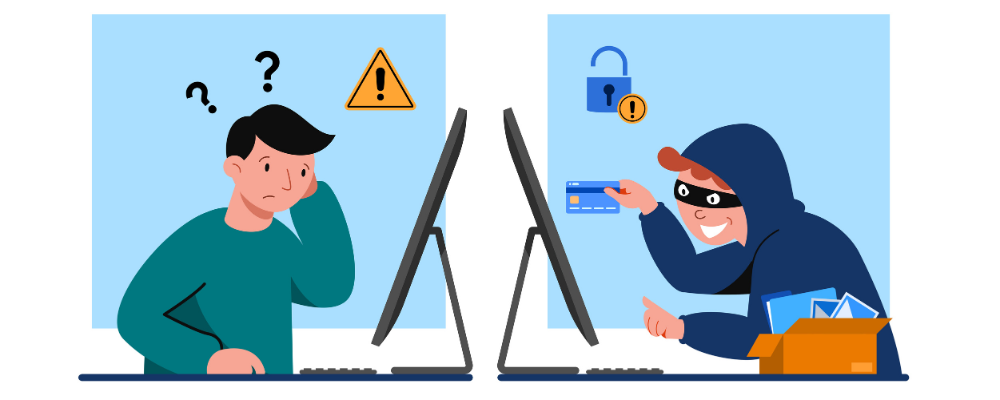Metaverse Domain Scams

It is no lie that the metaverse brings a world of opportunities to its users as the future of the internet. But no matter how advanced the technology gets, there is no permanent solution yet to prevent internet scams. Even in Web 2.0, you may have experienced or at least heard of domain name scams. Therefore, the same happened with the domain naming market and can occur in the metaverse domain market.
Metaverse domains are created, stored, and transferred on the rapidly evolving decentralized platform. So obviously, the risk is even higher. The only thing users can do is to be aware of them and take precautions when dealing with metaverse domain names. Which is exactly what we do in this article. So let’s start with what a domain scam is.
What is a metaverse domain scam?
“ A metaverse domain scam is a deceptive or fraudulent scheme within the metaverse domain space designed to deceive individuals or investors and ultimately result in financial losses or the theft of valuable digital assets. ”
As this platform is still new to the users, scammers have a good chance to deceive them. So let’s understand the types of metaverse domain scams.
Types of Metaverse Domain Scams And How To Avoid
- Phishing scams: Scammers can build fake metaverse domain registrars similar to legal metaverse domain registrars like cipzi. With these fake registrars scammers can trick users into entering their private keys, wallet information, and personal information which leads to identity theft or loss of valuable digital assets.
- How to avoid: Ensure that you are using a legal metaverse registrar by double-checking the website address. Be cautious if they direct you to put your login details or any private keys out of the normal registering process.
- Fake metaverse domain sales: It is possible that scammers pretend to sell quality and memorable metaverse domain names and after they receive the payment, they won’t transfer the ownership of the domain to the user. Or they will transfer a less quality metaverse domain which is worthless to the money you paid.
- How to avoid: Always use reputable metaverse domain sellers to buy metaverse domain names. Always verify that the sellers and legal and also the legitimacy of the domain names they are offering.
- Impersonation: Scammers pretending to be a metaverse domain owner. Even if they do not own a metaverse domain name, they pretend to resell their memorable and valuable metaverse domain name to you. After they receive the payment, there is nothing you can do to get that money back.
- How to avoid: Always seek for the identity and authenticity of the seller. Confirm the ownership of the asset first and then proceed to purchase the asset. Be cautious if the seller rushes you to sell the asset or make quick decisions.
- Pump and dump schemes: Fraudsters and scammers fakely inflate the prices of Metaverse domains by doing some fake advertising in order to sell their cheap Metaverse domain stocks at higher prices(pump). With the advertising and marketing, the price will increase for some time and when the selling is over, the inflation normalizes. Users no longer can resell these metaverse domains for the price they purchased(dump).
- How to avoid: Purchasing a metaverse domain name is a life-changing decision. So take some time and do thorough research on metaverse domain names and domain trendings. If they are actually quality metaverse domain names with time value will increase but slowly.
- Counterfeit: This is also possible that scammers create counterfeit metaspaces such as gaming platforms, meeting rooms, and social platforms and try to sell them with another metaverse domain name.
- How to avoid: Verify the ownership of the platform first. Inspect virtual platforms and associated domain names closely. Study the history of the seller.
- Fake investment projects: Some scammers can give an overrated introduction to metaverse domain names as investing in these assets is the best and quickest way to get a high return on investment. they motivate unsuspecting investors to invest a lot of money in metaverse domains.
- How to avoid: Before investing do research on metaverse domain trends and current rates. Think twice about a project that offers guarantees and unrealistic investment returns.
Common tactics used by scammers
- Creating fake metaverse domain registrars: this is a popular method used by scammers, they create fake meta domain registrar websites that look exactly like legitimate meta domain registrars using the same colors, font styles, and logos to trick users.
- Sending deceptive emails or messages: scammers can send emails or direct messages to the users including links to their fake websites, pretending to be a legal meta domain registrar services.
- Selling low-quality meta domains for a higher price: scammers can present no-value meta domain names as very sought-after meta domains and make users believe that they are investing in a high-value meta domain name.
What Can I Do To Prevent Meta Domain Scams?
Preventing metaverse domain scams needs a combination of vigilance, education, and adopting best practices. Here are some effective ways to protect yourself from metaverse domain scams.
- Stay Informed: Educate yourself about common metaverse domain scams and familiarize yourself with the tactics scammers use. Regularly update your knowledge about new scam trends and techniques.
- Reputed Domain Sellers: Purchase metaverse domain names only from reputable and veryfied sellers. Research the background of the meta domain seller, check for reviews, and verify their legitimacy before making any transactions.
- Be Cautious with your Private Information: Never share your private keys, wallet information, or personal information with anyone you do not trust. Legitimate transactions do not require sharing sensitive details outside the normal registration process.
- Check Domain Ownership: Verify the ownership of the metaverse domain before making any purchase. Ensure that the seller has the legal right to transfer ownership.
- Unrealistic Deals: Be cautious if a deal seems too good to be true. Scammers may offer seemingly attractive deals to lure users into making quick decisions. Before making any purchasing decisions, do a research and then proceed.
- Secure Payment Methods: When making payments for metaverse domain names, use secure and trusted payment methods. Avoid sharing sensitive information such as private keys unless you are certain about the legitimacy of the transaction.
By following these precautions, you can significantly reduce the risk of falling victim to metaverse domain scams.
As you can see, by being updated about the metaverse domain world, using reputed, trusted, and legal services, and making decisions after doing thorough research you can minimize risks like these.
So we think now you are safe in the metaverse space. If there is anything you need to know about the metaverse domain scams please contact us. We are waiting to solve your problem!
